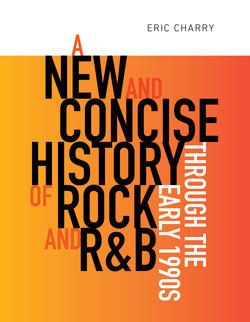Читать книгу A New and Concise History of Rock and R&B through the Early 1990s - Eric Charry - Страница 6
На сайте Литреса книга снята с продажи.
ОглавлениеLIST OF FIGURES
1. Copyright in the United States 185
2. Copyright timeline 187
3. Growth of the recording industry in the United States to the 1930s 188
4. Growth of radio in the United States 190
5. Music on television, 1940s–1980s 191
6. African Americans in starring roles in television 192
7. Magazines 193
8. Industry popularity charts (Billboard) 194
9. Grammy categories 195
10. Innovations in sound and musical instrument technology, 1948–2001 196
11. “High Water Everywhere, Part 1,” by Charley Patton 197
12. Early blues singers 198
13. Twelve-bar blues form 199
14. Some key independent record labels, 1940s–1950s (date founded and artist’s debut recording) 200
15. “Choo Choo Ch-Boogie,” by Louis Jordan 201
16. Electric blues guitarists, 1950s–1960s (R&B Top 10 single hits and pop LP debuts) 202
17. Women R&B singers, 1940s–1950s (R&B Top 10 single hits and crossovers to pop Top 40) 203
18. Birth years of early rock and roll, soul, and funk leaders 204
19. Elvis Presley Top 10 hits 205
20. Top 40 crossover pop hits by black rock and roll artists 207
21. Five cover comparisons, 1954–1956 208
22. Five styles of early rock and roll, 1954–1956 209
23. Rockabilly artists and their debut recordings 210
24. “Stand by Me” form and arrangement 210
25. Brill Building songwriting teams and select pop hits 211
26. Teen idols: Late 1950s–1960s Top 40 hits 212
27. Motown pop Top 10 singles, 1960–1970 213
28. Birth years of singer-songwriters 215
29. Bob Dylan Top 40 pop singles and LPs in the 1960s 216
30. Beach Boys, Beatles, and Rolling Stones pop Top 40 comparisons, 1962–1971 217
31. Beatles U.S. albums: Pop album chart positions 220
32. British Invasion groups/artists and debuts in U.S. pop singles Top 40 221
33. Birth years of early 1960s groups 222
34. Soul: Naming a genre in song and album titles 223
35. Mid to late 1960s U.S. rock (psychedelic and hard) 224
36. Funk: Naming a genre in song and album titles 225
37. Groups with organ, 1960s 226
38. Integrated groups, 1960s to early 1970s 227
39. Groups with Latin percussion 227
40. Birth and death years of 1960s musicians 228
41. All-time Top 40 hits: Soloists and groups (through 1999) 229
42. Blaxploitation films and the next generation 231
43. Funk bands: Their debut LP year and their first pop Top 10 single 232
44. Progressive, art, experimental, and glam rock 233
45. Early to mid 1970s rock: Top 40 singles and albums 234
46. Folk rock and country rock groups 235
47. Disco singers and groups and their debut disco LPs 236
48. Punk and new wave groups and their debut LPs 237
49. Disco and punk comparisons 238
50. Women rock singers fronting bands, 1970s 239
51. Gendered instruments 240
52. Jazz and jazz rock albums in the pop Top 40 241
53. Rap groups and LPs moving into the mainstream, 1984–1990 243
54. Some key rap record labels 244
55. “Fight the Power” sample and lyric sources 245
56. Early metal groups, new wave of British heavy metal, and American metal 246
57. Hard rock, metal, and punk comparisons 248
58. Second British Invasion groups: Artists and first pop Top 10 singles 249
59. Superstars of the 1980s 250
60. Rock for a cause 251
61. Alternative, indie, and postpunk 252
62. Rap groups entering the pop Top 10 (albums), 1992–1997 253
63. Solo emcees entering the pop Top 10 (albums), 1993–1997 254
64. Women rock singer-songwriters, 1994–1997 255
